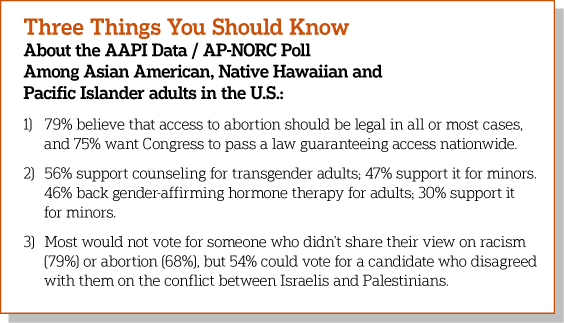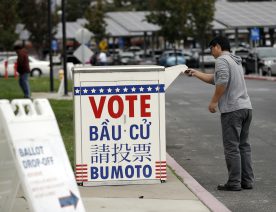
March 21, 2024
Three quarters of AAPI adults want Congress to pass a law to ensure nationwide access to abortion. They are also more supportive than the general public of access to abortion through 24-weeks.
In the year and a half since the Supreme Court overturned Roe v. Wade, most Asian American, Native Hawaiian and Pacific Islander (AAPI) adults believe abortion should be legal (79%) in all or most cases and want Congress to pass a law guaranteeing access nationwide (75%), according to a new AAPI Data/AP-NORC Center survey. This level of support surpasses the support among all U.S. adults, where 64% favored legal abortion and 60% support national legislation guaranteeing abortion rights nationwide in June 2023, when these questions were last put to the general population.
AAPI Democrats are more likely than AAPI Republicans to favor a law protecting abortion access nationwide (91% vs. 51%), while AAPI Republicans are more likely to be in favor of banning abortion access nationwide (24% vs. 7%) or allowing individual states to decide its legality (55% vs. 29%).
Across AAPI communities, about 9 in 10 support legal abortion in cases where a pregnant person’s health is at risk, for instances of rape or incest, or the presence of a fatal fetal abnormality, aligning with the general U.S. population. However, AAPI adults are more inclined than the general public to support legal abortion for any reason (68% vs. 54%). They are also more likely than the general population to support abortion access at 15 weeks (65% vs. 51%) and 24 weeks (41% vs. 27%). And about 6 in 10 AAPI adults favor coverage for abortion by private and public insurers for both adults and minors.
Most AAPI adults believe that people in their community have adequate access to family planning services (59%) and prenatal care (55%), but fewer say the same about abortion (44%) or gender-affirming care (38%). About a third of AAPI adults find abortion, gender-affirming care, and prenatal care difficult to access, while 28% express the same concern about family planning services and birth control. Similar proportions of U.S. adults say it is too hard for women to access abortion (39%) but fewer believe family planning services (28%) and prenatal care (28%) are too hard to obtain.
While a majority (56%) of AAPI adults support medically supervised gender-affirming counseling and therapy for transgender adults, fewer support it for minors (47%). Similarly, while 46% back gender-affirming hormone therapy for adults, this support drops considerably for minors (30%). AAPI adults with personal ties to transgender or nonbinary people are more likely to support access to both counseling and hormone therapy for adults and minors, as are individuals without any religious affiliation.
Half of AAPI adults support private health insurance coverage for transgender care, while 18% oppose it, and 30% remain neutral. Opinions on public health insurance programs like Medicaid or Tricare for transgender or nonbinary adults are more divided, with 45% in favor, 28% opposing, and 25% expressing no opinion. Sentiments regarding coverage for transgender minors through state public health insurance programs are similar, with 42% in favor, 32% opposed, and 26% remaining neutral.
Roughly half of AAPI adults approve of Joe Biden’s handling of abortion issues, which is higher than the general population (52% vs. 39%) who were last asked in June 2023. About half of AAPI adults disapprove of his handling of gun policy, though this disapproval is less pronounced than in the general population (53% vs. 64%) who were last asked in August 2023. While two-thirds of AAPI adults disapprove of Biden’s handling of the Israeli-Palestinian conflict, opinions on his approach to the Russian-Ukrainian conflict are evenly divided.
AAPI communities have greater trust than the general population in the Democratic handling of both abortion (55% vs. 42%) and gun policy (49% vs. 32%). However, when it comes to the conflict between the Israelis and Palestinians, nearly half of AAPI adults (46%) trust neither party, and about a third (34%) trust neither party regarding the Russia-Ukraine conflict.
AAPI adults ages 18 to 29 are generally less supportive of Biden’s handling of issues and less trusting of either political party to manage these issues than older AAPI adults.
Most AAPI adults say they could not vote for a candidate with opposing views on racism or discrimination (79%), abortion (68%), gun policy (66%), crime or violence (65%), immigration (63%), climate change (59%), or the economy (57%). However, more than half (54%) would be willing to vote for a candidate who was not aligned with their views on the conflict between Israelis and Palestinians.

The nationwide study was conducted by The Associated Press-NORC Center for Public Affairs Research and AAPI Data from February 5–14, 2024, using the Amplify AAPI Monthly survey drawing from NORC’s Amplify AAPI® Panel designed to be representative of the U.S. Asian American, Native Hawaiian, and Pacific Islander household population. Online and telephone interviews were offered in English, the Chinese dialects of Mandarin and Cantonese, Vietnamese, and Korean with 1,172 Asian American, Native Hawaiian, and Pacific Islanders aged 18 and older living in the United States. The margin of sampling error is +/- 3.9 percentage points.






